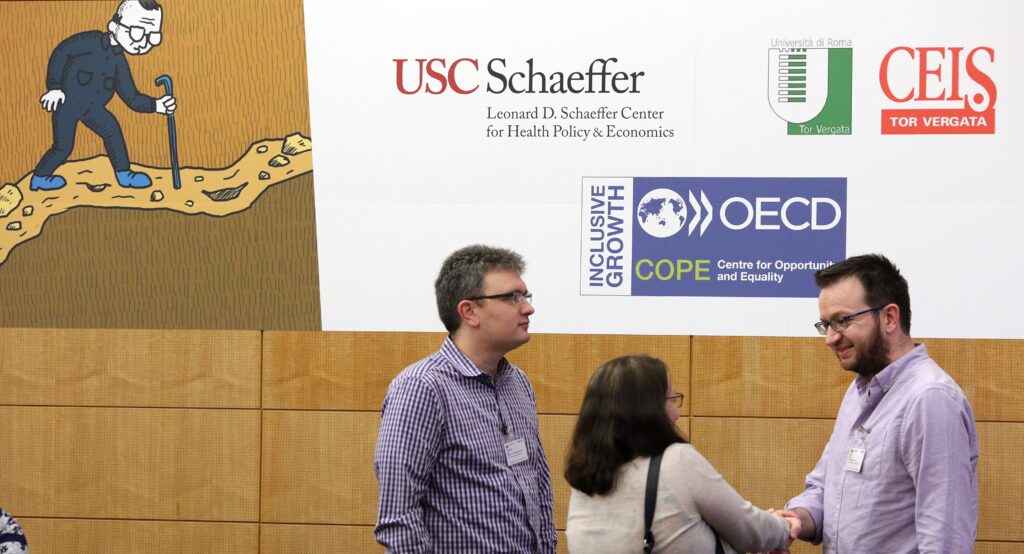Governments are challenged to sustain pension and health care systems due to population ageing and increasingly tight fiscal conditions. Developing a base of evidence upon which to evaluate policy options to sustain government programs is often challenging due to incomplete or missing data. Further, when data are available for policy evaluation, they are often too highly aggregated to be useful for evaluating how policies may indirectly increase or reduce socio-economic and health inequalities.
To address the need for better evidence, for over a decade the Roybal Center for Health Policy Simulation at the USC Schaeffer Center has been researching the determinants of health and health spending among older populations; developing models to understand the consequences of social policy, social forces, and biomedicine for health, health spending, and health care delivery; and translating these findings for policy makers who influence ageing policy.
In 2017, the OECD released Preventing Ageing Unequally – a report that examines how the two global megatrends of population ageing and rising inequalities have been developing and interacting, both within and across generations. The OECD partnered with the Roybal Center and the Centre for Economic and International Studies, University of Rome Tor Vergata to develop a pilot model (Global FEM) that projects the health and economic circumstances of population cohorts in Belgium, Italy and the US to assess how current income inequalities during the working age could pass into inequalities at older ages and the impact of inequality in life-expectancy trends on social benefits.
Results of this collaboration will be discussed on Day 1 in the context of policies for better and more equal health and economic outcomes in the retirement years. Day 2 will be for researchers and country representatives interested in building a country-level Future Elderly Model.
Workshop organised by the USC Schaeffer Center for Health Policy & Economics, CEIS Tor Vergata and the Organisation for Economic Co operation and Development (OECD).
- Event Date
- Thursday, April 05, 2018 - Friday, April 06, 2018
9:00 AM - 12:00 PM Paris - Location
- OECD Conference Centre
2 rue André Pascal
Paris, France
Panel
9:30 AM Welcome
- Mark Pearson, Employment, Labour and Social Affairs, OECD
9:45 AM Keynote: Ageing Readiness - How successfully are societies preparing for ageing populations and what can we do to strengthen today’s young adults?
- Jack Rowe, Columbia University
10:30 AM Coffee Break
11:00 AM Ageing in Europe - What are the projections for the future elderly in Europe? What policies may be needed?
- Vincenzo Atella, University of Rome Tor Vergata
- Godwin Mifsud, Working Group on Ageing Populations and Sustainability, European Commission
12:00 PM Ageing in Asia -What are the projections for the future elderly in Japan, Korea, and Singapore? What policies may be needed?
- Hideki Hashimoto, University of Tokyo
- Daejung Kim, Korean Institute of Health and Social Affairs
1:00 PM Lunch
2:15 PM Keynote: Challenges in Reducing Inequalities - What are the challenges in reducing health and economic inequalities and the concerns about the future?
- Peter Orszag, Lazard Freres & Co LLC and Brookings Institution
Joining by Webex
2:45 PM Ageing in North America -What are the projections for the future elderly in Canada, Mexico, and the US? What policies may be needed?
- Pierre-Carl Michaud, HEC Montréal
- Enrique Vega, World Health Organization/Panamerican Health Organization
3:45 PM Coffee Break
4:00 PM Keynote: Health Returns to Education - How can childhood interventions yield education returns and healthier aging?
- James Heckman, University of Chicago (Joining by Webex)
- Dana Goldman, University of Southern California
4:45 PM Health and Retirement - What does the future hold under current policies? What might we want to change?
- Maciej Lis, Social Policy Division, OECD
- Walter Ricciardi, Catholic University of the Sacred Heart
5:30 PM Synthesis - How can we capitalize upon modelling tools and results to help countries to reduce inequalities and to promote healthy and productive societies?
- Dana Goldman, University of Southern California
9:30 AM Technical Overview - How are microsimulations structured, what kind of questions can be addressed, and how well have these models performed in the past?
- Bryan Tysinger, University of Southern California
10:45 AM Coffee Break
11:00 AM Technical Working Section - A hands-on training for the technical audience.
- Bryan Tysinger, University of Southern California
- Andrea Piano Mortari, University of Rome Tor Vergata
- Federico Belotti, University of Rome Tor Vergata
